What they’re saying: Alabama reactions to John McCain’s passing
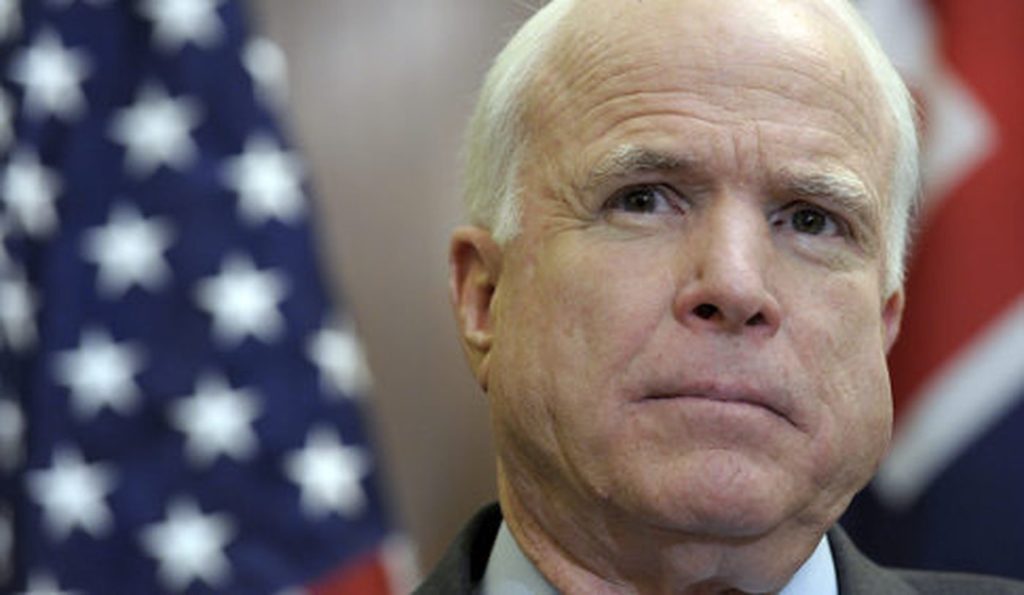
The Alabama delegation is paying tribute to Sen. John McCain, a former prisoner of war in Vietnam who served as a U.S. senator from Arizona for more than three decades, who died Saturday at the age of 81. Below are some of the reactions to his death: Sen. Richard Shelby: John McCain was a brave American and a true hero – one who honorably served our country for 60 years. His distinguished presence in the Senate will be missed, and his unwavering commitment to our country will live on in his legacy. The McCain family remain in our thoughts and prayers during this hard time. U.S. Rep. Bradley Byrne (AL-01): Last year, I had the opportunity to visit the “Hanoi Hilton” with Senator McCain, where he was held captive. It was a remarkable experience that I will never forget. May his service to our country never be forgotten. His family, friends, and colleagues will be in our prayers. U.S. Rep. Martha Roby (AL-02): Senator McCain was an American hero who led a remarkable life of service to this country. His bravery and sacrifice will never be forgotten. My prayers are with his family during this difficult time. U.S. Rep. Robert Aderholt (AL-04): I’m sorry to hear of the death of Senator John McCain. He and so many other American military personnel survived an existence as a POW in Vietnam that most of us could never imagine. My prayers to his family during this difficult time. U.S. Rep. Mo Brooks (AL-05): .@SenJohnMcCain fought for his country honorably in the Navy, the House, and the Senate for 60 years. He was an American patriot & his life is a testament to his deep love of country. John McCain will be sorely missed. U.S. Rep. Gary Palmer (AL-06): Ann and I send our condolences to the McCain family. We are praying for them during this difficult time. U.S. Rep. Terri Sewell (AL-07): Tonight my prayers are with Senator John McCain’s family. As a Navy pilot and as a lawmaker, he served with honor and integrity. Senator McCain was a true patriot! Rest in peace.
After long fight against brain cancer, John McCain ends treatment
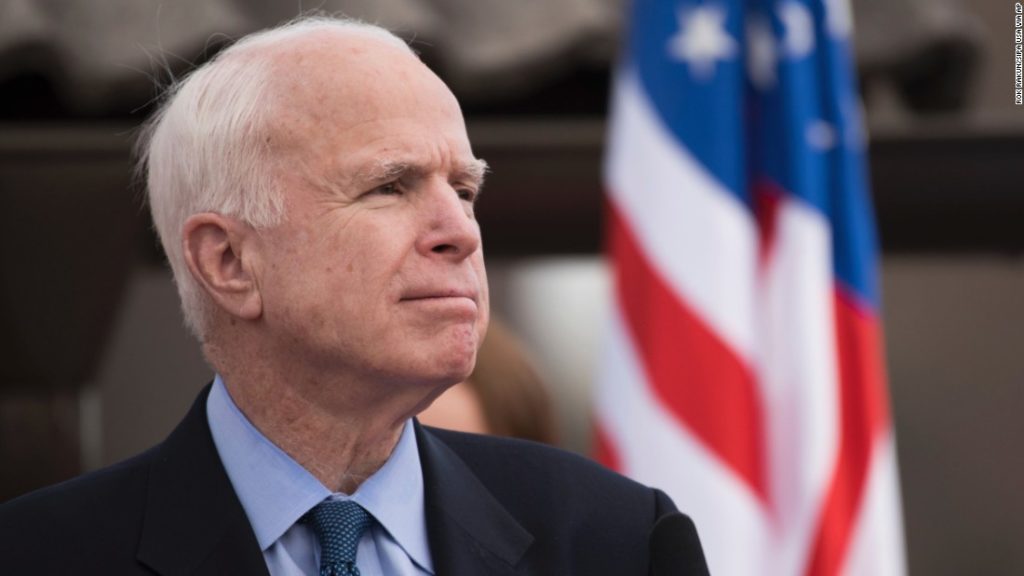
Arizona Sen. John McCain has discontinued medical treatment for an aggressive form of brain cancer, his family says. It’s a likely indication that the war hero, onetime presidential nominee and longtime lawmaker is nearing the end of his life. The 81-year-old McCain has surpassed expectations for survival, but “the progress of disease and the inexorable advance of age render their verdict,” the family said in a statement. “With his usual strength of will, he has now chosen to discontinue medical treatment.” The six-term GOP senator, whose birthday is Aug. 29, has been away from the Capitol since last December. McCain’s wife, Cindy, said in a tweet Saturday that the McCain family was “overwhelmed by the outpouring of love and support from around the world” after Friday’s announcement. If McCain should resign his seat or die soon, Republican Arizona Gov. Doug Ducey would name a replacement to serve until the 2020 election. The winner of that election would serve the remainder of McCain’s term through 2022. The entire McCain family is overwhelmed by the outpouring of love and support from around the world. Thank you. — Cindy McCain (@cindymccain) August 25, 2018 In more than three decades in Congress, McCain became known as a political maverick willing to stick to his convictions rather than go along with party leaders — an independent streak that has drawn a mix of respect and ire. Most recently, he has been a thorn in the side of President Donald Trump, keeping up his criticism of the White House even while undergoing severe medical treatment in Arizona. In July, he issued a searing rebuke of Trump’s summit with Russian President Vladimir Putin, calling it a “tragic mistake” and “one of the most disgraceful performances by an American president in memory.” The strained relationship between Trump and McCain dates back to 2015, when Trump suggested the Vietnam veteran, who spent more than five years in a North Vietnamese prison after his Navy plane was shot down, was not a war hero. The ill will grew after McCain voted in 2017 against a Republican replacement for the Obama-era health law. He doomed the bill with a dramatic thumbs-down on the Senate floor. Complaints about McCain’s vote have become a staple of Trump’s campaign speeches. He doesn’t mention McCain by name but makes clear his intent by mockingly imitating the thumbs-down gesture. The feud between the two men has persisted even amid the decline in McCain’s health. While political leaders of both parties paid tribute to McCain and offered prayers Friday, Trump and the White House remained silent. Trump did not mention McCain or the health care vote in a speech Friday night at a fundraising dinner in Ohio. Earlier this month, Trump signed a military policy bill named for McCain, but he made no mention of McCain at a signing ceremony. The son and grandson of Navy admirals, McCain is a former Navy pilot. He was elected to Congress in 1982 and to the Senate four years later, replacing the retired Barry Goldwater. Despite his famous stubborn streak and occasional orneriness, McCain is widely admired on both sides of the aisle, and tributes poured in Friday after the family announced the treatment decision. “We are so fortunate to call him our friend and colleague,” Senate Majority Leader Mitch McConnell said on Twitter. “The entire McCain family are in our prayers at this incredibly difficult hour.;; Ducey called McCain “an American hero” who always put his country before himself. A “spirt of service and civility” guided McCain’s life, standing as a model for Americans regardless of political affiliation, Ducey said. McCain had surgery in July 2017 to remove a blood clot in his brain after being diagnosed with an aggressive tumor called a glioblastoma. It’s the same type of tumor that killed Sen. Edward M. Kennedy, D-Mass., at age 77 in 2009. McCain rebounded quickly, however, returning to Washington and entering the Senate in late July to a standing ovation from his colleagues. In a dramatic turn, he later cast the deciding vote against the Republican health care bill, earning Trump’s enduring wrath. McCain’s condition worsened last fall, and he has been in Arizona since December. A source close to McCain who asked not to be identified said Friday the senator was at his Arizona ranch with his family. He is a long-term survivor of melanoma, a deadly skin cancer. But doctors classified his brain cancer as a “primary tumor,” meaning it’s not related to his former malignancies. McCain ran unsuccessfully for the Republican presidential nomination in 2000, then won it in 2008 before losing the general election to Obama. When Republicans took control of the Senate in 2015, McCain embraced his new influence as chairman of the Armed Services Committee, pushing for aggressive U.S. military intervention overseas and eager to contribute to “defeating the forces of radical Islam that want to destroy America.” Asked how he wanted to be remembered, McCain said: “That I made a major contribution to the defense of the nation.” Former Connecticut Sen. Joseph Lieberman, a close friend, said Friday that “becoming John McCain’s friend has been one of the great blessings of my life. Today I am praying for him and his family.” Mitt Romney, the GOP’s 2012 presidential nominee, said on Twitter, “No man this century better exemplifies honor, patriotism, service, sacrifice and country first than Senator John McCain. His heroism inspires, his life shapes our character. I am blessed and humbled by our friendship.” Republished with the permission of the Associated Press.
GOP senators rave about Brett Kavanaugh; Dems prepare to grill him

Now that Supreme Court nominee Brett Kavanaugh has met privately with almost every Republican senator, it’s becoming increasingly clear President Donald Trump’s pick for the bench is running into little GOP resistance to confirmation this fall. The conservative appellate judge is breezing past swirling questions over his views on executive power and his approach to gay marriage, abortion and other legal issues. Kavanaugh left some Republicans with the impression that his earlier reluctance to investigate sitting presidents would not impede the Russia investigation of special counsel Robert Mueller. Other senators avoided such queries, preferring more of a get-to-know-you session with the 53-year-old judge to hear his story. Ask the GOP senators what they’re learning in their private chats and they’ll tell you the following: Kavanaugh loves his family. Lives for the law. And, like the president he once worked for, George W. Bush, he’s open and chatty, the kind of guy you’d like to have a beer with. “I just wanted to understand — try to understand — what’s in his heart,” said Sen. John Kennedy, R-La., who added that he was saving his legal questions for Kavanaugh’s confirmation hearings. “He impresses me as the sort of guy that would actually talk and get to know the people who clean his office.” The practice of Supreme Court nominees making “courtesy calls” to senators seems to have begun around 1970, according to the Senate Historical Office. That year, nominee Harry Blackmun made the rounds ahead of his confirmation hearing before the Judiciary Committee. Some senators use the visits to probe the nominee’s judicial philosophy, while others treat it more like a photo op. Since being nominated July 9, Kavanaugh has met with 47 senators — all but one of them Republican — at a rapid clip. The meetings have created growing momentum for Kavanaugh among Republicans that Democrats may be hard-pressed to stop. Even one early skeptic, Sen. Rand Paul of Kentucky, is now a yes vote. Still, the most challenging meetings for Kavanaugh are yet to come. Two key Republican senators, Lisa Murkowski of Alaska and Susan Collins of Maine, remain among the holdouts. They plan to meet with the judge this month. But even those two independent-minded senators, who both support abortion rights, may be unwilling to break with their party and prevent Trump from filling a second seat on the Supreme Court. Kavanaugh is also likely to meet with Democrats in mid-August, and they are certain to press the judge on a variety of hot-button issues. Only one Democrat,Joe Manchin of West Virginia, has met with Kavanaugh so far, and a person familiar with that session said Kavanaugh stressed his independence. The Republicans who have already met with Kavanaugh are leaving the meetings increasingly confident in Trump’s choice. Sen. David Perdue of Georgia said he asked the judge what he holds important. “We talked about how the partisanship really has created this gridlock and therefore it weakens us in terms of standing up,” said Perdue, a close ally of the president. “He says, ’Well, my desire all along has been to be a very studious defender of the Constitution and try to interpret the law, not make law.” Sen. Thom Tillis of North Carolina said he was satisfied that Kavanaugh’s earlier skepticism of special counsel investigations — like Mueller’s probe — was rooted in his work on Kenneth Starr’s team investigating Bill Clinton, rather than the events of today. “I don’t see how the two can be intertwined,” Tillis said. GOP Sen. James Lankford of Oklahoma said he did not broach the topic because he is already convinced Kavanaugh’s writings are not applicable to Mueller’s probe. “I didn’t take it that we shouldn’t do investigations. At all,” Lankford said. “The fact of the matter is Judge Kavanaugh is going to sit on the United States Supreme Court when we’re through,” said Sen. Orrin Hatch, R-Utah. Late last week, Democrats lost ground in their fight to unearth some 1 million documents related to Kavanaugh’s time as staff secretary at the Bush White House, a three-year stint on his resume that Republicans say is irrelevant to his qualifications for the court. Republicans have not asked for the records, and the National Archives has told Democrats it cannot process their request without GOP support. Kristine Lucius, the executive vice president for policy at the advocacy group The Leadership Conference on Civil and Human Rights, is pushing for the full release of the Kavanaugh documents and not those being handpicked by Republicans. She objects to “the notion that we would just have a curtain within three years of his record.” Democrats now plan to take their case directly to Kavanaugh, potentially turning the “courtesy calls” into cross-examination sessions of his thoughts on Bush-era topics like the detention of terrorism suspects and signing statements on legislation. Those subjects are likely covered in the documents Republicans refuse to seek. Republicans counter that there are already plenty of ways to scrutinize Kavanaugh’s record. He has handled more than 300 cases since 2006 as an appellate judge. Already the Judiciary Committee has requested some 125,000 files from Kavanaugh’s other years in the White House counsel’s office and 20,000 from his work on the Starr investigation. And with a 51-49 GOP majority in the Senate, narrowed with the longtime absence of the ailing Sen. John McCain, R-Ariz., Republicans will be able to confirm Kavanaugh if they hold together and prevent defections. GOP Sen. Deb Fischer of Nebraska said she was preparing a floor speech to deliver after her meeting with Kavanaugh, whom she found to be an incredibly open, honest man. “I don’t know how anyone could oppose him,” she said. “I really don’t.” Republished with the permission of the Associated Press.
Democrats will try forcing Senate vote against Donald Trump health plan
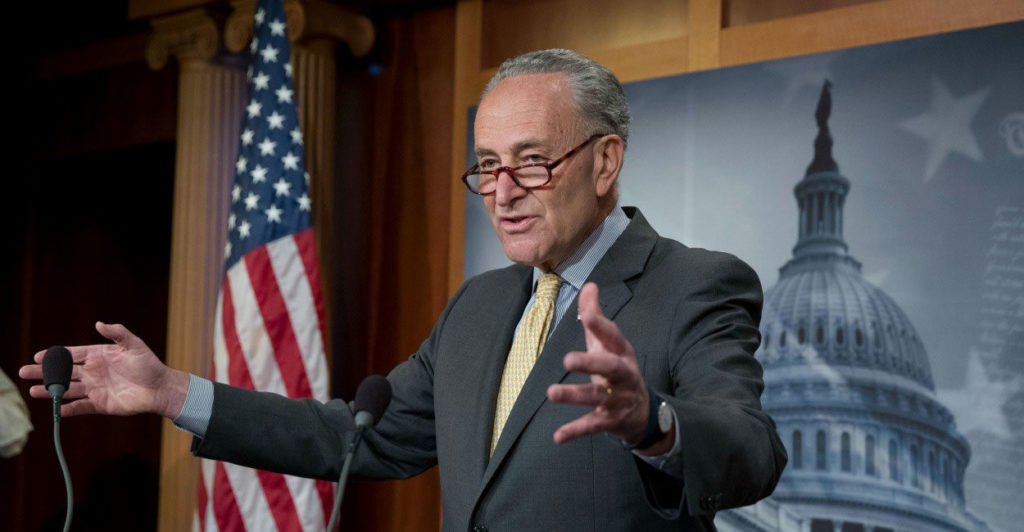
Democrats will try forcing a campaign-season vote on blocking a Trump administration rule allowing insurers to sell short-term plans that are cheaper but skimpier than allowed under the Obama health care law, party leaders said Thursday. Though the effort has a chance of passing the narrowly divided Senate, it is certain to die in the Republican-controlled House. Even so, Democrats believe a pre-election Senate vote would put GOP senators in a difficult spot because the new plans won’t necessarily contain popular features like covering people with pre-existing medical conditions or certain benefits like prescription drugs. “This is an issue the American people should know where everyone stands,” Senate Minority Leader Chuck Schumer, D-N.Y., said in a conference call with reporters. With many Republicans saying they back covering people with pre-existing medical problems, Schumer added, “Let them instead of saying they’re for it actually do something to preserve pre-existing conditions.” Democrats said they will use the seldom-utilized Congressional Review Act, which under some circumstances lets any senator force a vote on overturning recent actions taken by federal agencies. Sen. Tammy Baldwin, D-Wis., who faces a potentially competitive re-election contest in November, will lead the effort. Republicans control the Senate 51-49, but Sen. John McCain, R-Ariz., has been gone since December battling brain cancer. Democrats would need at least one GOP lawmaker to side with them to prevail in the Senate. They are viewed as having a chance of capturing Senate control in this fall’s elections. Republished with the permission of the Associated Press.
Lawmakers struggling to develop a response to Donald Trump, Vladimir Putin

Congress is producing an unusual outpouring of bills, resolutions and new sanctions proposals to push back at President Donald Trump’s approach to Vladimir Putin, shore up relations with NATO allies and prevent Russian interference in the midterm election. But it remains uncertain if any of their efforts will yield results. Lawmakers are struggling with internal party divisions as well as their own onslaught of proposals as they try to move beyond a symbolic rebuke of Trump’s interactions with the Russian president and exert influence both at home and abroad. And while many Democrats are eager for quick votes, some Republicans prefer none at all. As Trump and Putin weigh another face-to-face meeting, lawmakers in both parties — particularly in the Senate — appear motivated to act. Senate Majority Leader Mitch McConnell issued a rare warning that Russia “better quit messing around” in U.S. elections as he tasked two Senate committees to start working on sanctions-related legislation and other measures to deter Russia. In the House, Speaker Paul Ryan joined McConnell in saying that Putin would not be welcome on Capitol Hill, though he did not push forward any Russia-related legislation before his chamber recessed for August. Still, the past few weeks have been one of the rare moments in the Trump era that Republicans and Democrats have jointly asserted the role of Congress as a counterweight to the administration. “You look at the action of Congress since the summit in Helsinki, you find Democrats and Republicans both standing up and saying no,” said Sen. Ben Cardin, D-Md., in an interview on C-SPAN with The Associated Press and The Washington Post. For starters, there’s a bipartisan push from Sen. John McCain, R-Ariz., Sen. Tim Kaine, D-Va., and others to “explicitly prohibit” the president from withdrawing from NATO without Senate approval. Other senators are debating action to prevent meddling in the midterm election. Sen. Lindsey Graham, R-S.C., and Sen. Amy Klobuchar, D-Minn., call the protection of the election system a “national security priority.” Graham said it’s “extremely important that Congress recognize the threat to our electoral system coming from Russia and act in a decisive way.” In addition, legislation from McCain and Cardin would require approval from Congress before Trump could reverse sanctions issued under the Sergei Magnitsky Act, which bans visas for travel and freezes assets of key Russians involved in alleged human rights abuses. Russia’s displeasure at the 2012 Magnitsky Act played into what Trump initially called an “incredible offer” from Putin at the summit to allow U.S. questioning of Russians indicted by the Justice Department for hacking Democratic emails. In return, Putin requested the ability to investigate Americans involved in the Magnitsky Act. McCain called it a “perverse proposal” and Trump has since backed away from it. With some 100 days before the midterm election, some say Congress is not acting fast enough. One bill that has been given a go-ahead nod from McConnell is legislation from Sen. Marco Rubio, R-Fla., and Sen. Chris Van Hollen, D-Md., that attempts to warn Putin off more election interference by setting up tough new sanctions on Russia if it does try to intervene. The measure is slowly making its way through the Senate Banking Committee, but some lawmakers in the House and Senate have raised concerns it casts too wide a net and could cause problems for allied nations that do business with Russia. Rubio says he’s willing to adjust the legislation to meet concerns, but says the goal is for Russia to understand there will be a price to pay for further election interference. He adds the legislation was introduced months before the Helsinki summit and isn’t intended to embarrass or attack the president. “I’m deeply concerned about their ability to interfere in our politics,” Rubio said in an interview. “We want them to know what the price is going to be to make that choice.” The legislation would likely see overwhelming support, lawmakers in both parties say. But a vote is not scheduled. Some symbolic measures on Russia have failed to make it out of the starting gate. Already, the Senate has blocked a symbolic resolution from Sen. Jeff Flake, R-Ariz., and Sen. Chris Coons, D-Del., to reaffirm the findings of the American intelligence community that Russia interfered in the 2016 election. Twice over the past two weeks, Republicans objected to motions to advance the measure, saying they prefer a more strategic approach that goes beyond symbolic resolutions. House Democrats were similarly thwarted in their attempts to slap new sanctions on anyone who has interfered in U.S. elections and bolster election security funds to the states as Republicans blocked those votes. Key Republicans are panning more federal spending on election security. The GOP chairman of the Senate Appropriations Committee, Alabama Sen. Richard Shelby, said Monday that he worried federal funds would come with “strings attached” that would interfere with elections operations he believes should be left to the states. Ryan says the U.S. has “learned a great deal” about Russian interference. “So, I think we’re far better prepared today than we were just a couple of years ago.” But the Speaker added there’s more for Congress to do. Republished with the permission of the Associated Press.
What to expect in the Supreme Court confirmation battle

The coming battle over a Supreme Court nominee promises to be a bruising one. Republicans are eager for conservatives to gain a firm majority on the court. Democrats are voicing alarm about what the new justice could mean for charged issues such as abortion rights and gay rights. The stakes are enormous, and advocacy groups that don’t have to unveil their donors are spending heavily to shape the fight. President Donald Trump’s top contenders for the vacancy appear to be federal appeals judges Amy Coney Barrett, Thomas Hardiman, Brett Kavanaugh and Raymond Kethledge. Trump planned to announce his pick Monday night. Regardless of his choice, it’s likely that the closely divided Senate will be holding a momentous confirmation vote just weeks before the midterm election. A look at what to expect: Finding The Votes Republicans may have a narrower margin for error than they did when the Senate confirmed Trump’s first Supreme Court nominee, Neil Gorsuch, by a vote of 54-45 in April 2017. Democratic Sen. Doug Jones of Alabama has replaced Republican Sen. Luther Strange, cutting the GOP’s Senate majority to 51-49. Meanwhile, Republican Sen. John McCain of Arizona is battling brain cancer and has not been back to the Capitol since December. That increases the focus on two Republicans — Sen. Susan Collins of Maine and Lisa Murkowski of Alaska. Both support a woman’s right to have an abortion and will be looking for assurances that the nominee would not overturn the Roe v Wade decision establishing abortion rights. Trump pledged in 2016 that he would be “putting pro-life justices on the court.” On the Democratic side, the focus will be on Sens. Heidi Heitkamp of North Dakota, Joe Donnelly of Indiana and Joe Manchin of West Virginia. All three voted to confirm Gorsuch and are up for re-election in states that Trump won handily. Whatever they decide will upset a large group of voters in their home states. If Collins and Murkowski vote “no” and Democrats all vote “no,” the nomination would be blocked. If McCain were to miss the vote, only one GOP defection would be needed to block the nomination if all Democrats were opposed. Old Wounds Democrats are still stinging from Republicans refusing to even grant a hearing to President Barack Obama’s choice to serve on the Supreme Court, Merrick Garland. They are calling on Senate Majority Leader Mitch McConnell, R-Ky., to wait until after the November election to schedule a hearing and vote. McConnell has rejected that possibility, saying the decision to not fill the vacancy under Obama was prefaced on it being a presidential election year. Democrats say McConnell is being hypocritical in moving forward with the nomination. While that argument won’t sway Republicans, their strategy could stiffen Democratic resolve to oppose the nominee. Liberal advocacy groups are challenging Minority Leader Chuck Schumer, D-N.Y., to keep the Democrats united. Senate Relations Much of the groundwork for a successful confirmation comes in private meetings that the nominee will have with individual senators in the coming weeks. For lawmakers who are not on the Judiciary Committee, it may be their only chance to talk with the nominee personally before a final vote. Gorsuch met with nearly three-quarters of the Senate in advance of his hearings. The process is arduous, with the private meetings giving way to days of testimony before the Senate Judiciary Committee, which has 11 Republicans and 10 Democrats. Hearings for the most recent nominees to the Supreme Court have lasted four or five days, though there were 11 days of hearings for Robert Bork’s nomination in 1987. On average, for Supreme Court nominees who have received hearings, the hearing occurred 39 days after the nomination was formally submitted, according to the Congressional Research Service. The Judiciary Committee need not approve the nomination for it to advance. A negative recommendation or no recommendation merely alerts the Senate that a substantial number of committee members have reservations. The Fight Outside The Capitol Before the president has even made his announcement, advocacy groups are making clear they will play an important role in the coming fight. Groups that support abortion rights are planning a “Day of Action” for August 26, the anniversary of the 1920 adoption of the 19th Amendment giving women the right to vote. The liberal advocacy group Demand Justice will spend $5 million on ads through September and began airing spots Thursday in Maine and Alaska aimed at pressuring Collins and Murkowski. “Why won’t she rule out voting for Trump’s anti-choice picks?” both ads ask. It also plans to run ads next week in Manchin’s, Donnelly’s and Heitkamp’s home states with a softer tone, asking them to continue protecting people with pre-existing health conditions by opposing a nominee who’d threaten that. Meanwhile, the conservative Judicial Crisis Network is targeting vulnerable Democratic incumbents in its ad campaigns. The deep-pocketed group advertised against Senate confirmation of Garland and spent millions more advocating for Gorsuch. Republished with the permission of the Associated Press.
Immigration fight, tension on tariffs await Congress’ return
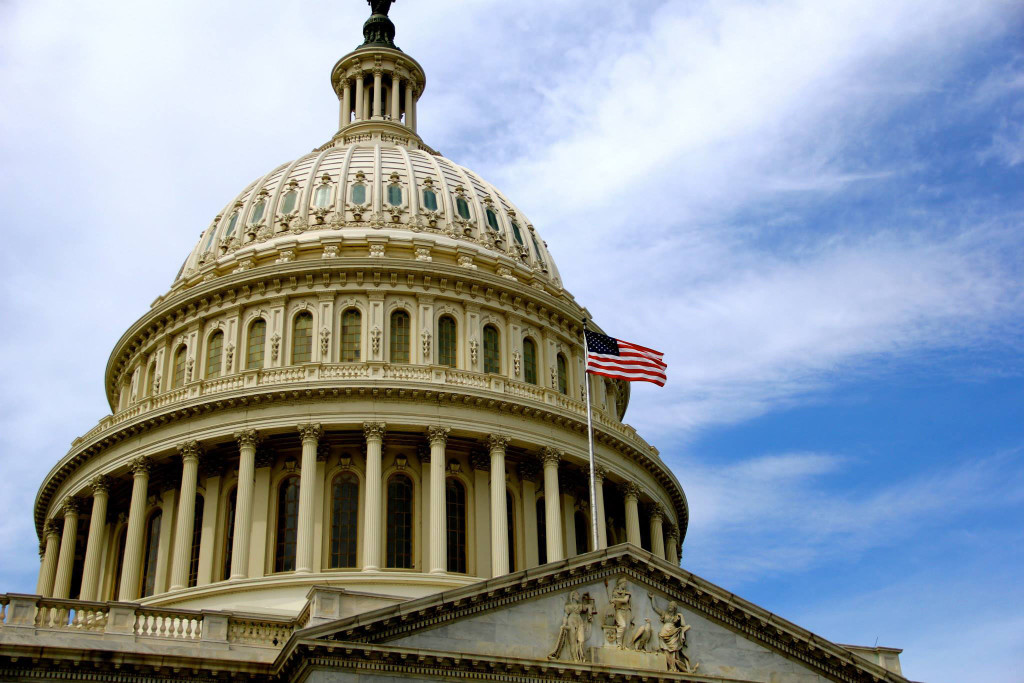
This was supposed to be the quiet time on Capitol Hill, but Congress returns to work Monday facing a showdown in the House over immigration while Senate Republicans are trying to stop an all-out trade war after President Donald Trump’s decision to impose import tariffs on close U.S. allies. Tensions are running particularly high as Senate Majority Leader Mitch McConnell is threatening to cancel the traditional August recess as he fights Democratic opposition to GOP priorities in a show of busy-work before the midterm election. It’s shaping up to be far from the typical summer slowdown when legislating usually makes way for campaigning. “Another summer, another heavy work load,” tweeted Sen. Chuck Grassley, R-Iowa, as he pushed to confirm nominations. “NOW is the time to vote on Fridays (even wknds!).” The Senate often is not in session on Fridays. Congress faces a few should-do items in the weeks ahead. Topping the agenda is passage of the annual defense bill, which includes pay raises for the troops. It has already cleared the House. The Senate could begin consideration of its defense bill this week. But the Senate version carries a warning to Trump with a trade provision to block any White House plan to lift penalties on the China-based telecommunications company ZTE, which faces trade law violations over selling sensitive technologies to U.S. adversaries. Trump’s moves on trade are expected to consume conversations among Senate Republicans this week. They’re worried about a wider trade war spiking prices for home-state businesses and consumers if Trump imposes steel and aluminum tariffs, as planned, on imports from Canada, Mexico and the European Union. Republicans will be making the case to the administration that the tariffs could dampen the economic gains from the GOP tax cuts and sour the mood among voters as lawmakers are campaigning to protect the Republican majority in Congress. Some Republicans are also hoping Trump simply changes his mind and doesn’t follow through with it. But aides said others may be signing on to a bill from Sen. Mike Lee, R-Utah, that would subject all trade actions by the executive branch, including tariffs, to congressional approval. Rep. Will Hurd, R-Texas, said he would support a similar move in the House. “Congress has shared our responsibility when it comes to trade with the executive branch over the last couple of decades, and I think that’s something that we need to re-evaluate,” he told CBS’ “Face the Nation.” Meanwhile, House Republicans face a self-imposed deadline Thursday for resolving an immigration standoff between GOP centrists who are forcing a vote on legislation to protect young immigrants who were brought to the country illegally as children and conservatives who want stricter immigration enforcement with money for Trump’s border wall. The centrists want to provide a way for the young immigrants to become permanent residents, which can lead to citizenship. Conservatives are opposed to creating a new pathway to staying in the U.S. permanently, equating it with granting amnesty to lawbreakers. Speaker Paul Ryan, R-Wis., and Majority Leader Kevin McCarthy, R-Calif., are trying to craft a Republican-led bill as a compromise between the factions, but it’s difficult. House leaders plan a two-hour private meeting of GOP lawmakers Thursday morning to hash out whether talks among the party’s factions have produced an immigration compromise that can win broad support. Underscoring the sensitivity of the session, staff is to be excluded. They’re trying to prevent the moderates from joining with Democrats to pass the “Dreamer” protections, which polls suggest are popular, but which would be a setback for GOP leaders and expose the majority to complaints from the conservative base. Without a deal, the moderates say they’ll push ahead with enough signatures on a so-called discharge petition to force the vote over the leadership’s objections. Hurd said moderates have the votes already, but are “engaged in conversations to figure out … is there another path. I don’t believe that there is.” Rep. Carlos Curbelo, R-Fla., said in an interview last week that he saw a 50-50 chance of those talks succeeding. He warned that if they didn’t bear fruit, he and his supporters “fully expect” to continue pushing their petition. Curbelo said the young immigrants must “be guaranteed a future in our country, meaning they cannot be exposed to deportation.” He said, “They must have permanent status immediately and they must have the option of a bridge into the legal immigration system,” meaning a pathway to citizenship. The moderates’ effort has won the backing of GOP Sen. John McCain, fighting brain cancer back home in Arizona, who tweeted on Saturday: “Congress can’t ignore this critical issue — and the many lives it impacts — any longer.” Starting Monday in the Senate, McConnell has teed up votes on three nominees to serve as federal district court judges, including the first Hispanic lawyer whom Trump nominated for the bench, Fernando Rodriguez Jr. of Texas. The selections are expected to receive bipartisan support, though more contentious votes are expected in coming weeks. Republicans have made it a top priority to get Trump’s nominees on the bench, to the alarm of Democrats, who say Republicans are working to stack the federal judiciary with young ideologues who will shape it for decades to come. Republished with the permission of the Associated Press.
Apology overdue? McCain flap overshadows Trump’s GOP lunch

Last fall, when President Donald Trump headed to Capitol Hill for the Senate Republican lunch, he was feuding with the powerful chair of the foreign relations panel and tweeted that the man couldn’t get elected dog catcher. On Tuesday, he dropped in on the weekly GOP lunch entangled in a controversy over an aide’s comment disparaging ailing GOP Sen. John McCain. At least one attendee said the McCain flap never came up, but several of the GOP leaders have said it’s past time for an apology from the White House. “The smart thing to do would have been five days ago to just nip it in the bud and come out and apologize for it,” said Sen. John Thune of South Dakota, the No. 3 Senate Republican. Trump’s Capitol Hill lunch Tuesday with Senate Republicans comes as the White House and its GOP allies are trying to coalesce around a political message ahead of the midterm elections. Also on the agenda is the White House push to get Senate approval on Trump’s nominee for CIA director, as well as Trump’s upcoming summit with North Korea. But much like when Trump was headed to the GOP Senate lunch to talk policy in October 2017, the White House agenda was eclipsed by another story. During a closed-door meeting last week White House communications aide Kelly Sadler dismissed McCain’s opposition to the CIA nominee by saying of the Arizona Republican: “He’s dying anyway.” The 81-year-old McCain was diagnosed in July with glioblastoma, an aggressive form of brain cancer. Sadler has apologized to the McCain family privately, but McCain’s daughter has asked for a public apology. The White House, which has appeared more focused on the fact the leak took place than its substance, has said it has dealt with the matter internally — but has refused to say how. In a tweet Monday, Trump said “so-called leaks” were a “massive over exaggeration” but added: “With that being said, leakers are traitors and cowards, and we will find out who they are!” The issue has left many senators unsettled. Several of McCain’s long-time colleagues, including Senate Majority Leader Mitch McConnell, South Carolina’s Lindsey Graham and former Vice President Joe Biden, have traveled to Arizona to visit the ailing senator. The “person who said that should apologize and apologize publicly,” McConnell said Tuesday of Sadler. When Trump attended the October Senate GOP luncheon, he was locked into a public feud with Sen. Bob Corker of Tennessee. Earlier that month, Corker had accused the president of intentionally being divisive and untruthful, and comparing the White House to an “adult day care center.” The morning of the luncheon, Trump tweeted that Corker “couldn’t get elected dog catcher in Tennessee.” Bob Corker, who helped President O give us the bad Iran Deal & couldn’t get elected dog catcher in Tennessee, is now fighting Tax Cuts…. — Donald J. Trump (@realDonaldTrump) October 24, 2017 The major issue at the time was tax legislation, which Trump and Republicans needed to pass after failing to rally behind a comprehensive health care bill. The tax bill was ultimately successful, despite the Trump-Corker diversion. Corker has said he will not seek re-election this fall. The following month, Trump lunched with GOP senators at the Capitol and declared it a “love fest,” reserving his wrath for Democrats on a spending bill. On Tuesday, Corker said that none of the senators raised the McCain issue. “That’s not what we do in these meetings,” he said. “No one would have brought up something like that.” Republicans are increasingly relying on the president to help protect the GOP’s slim 51-49 majority in the Senate this fall. Republished with the permission of the Associated Press.
After close vote, panel sends Mike Pompeo nomination to Senate
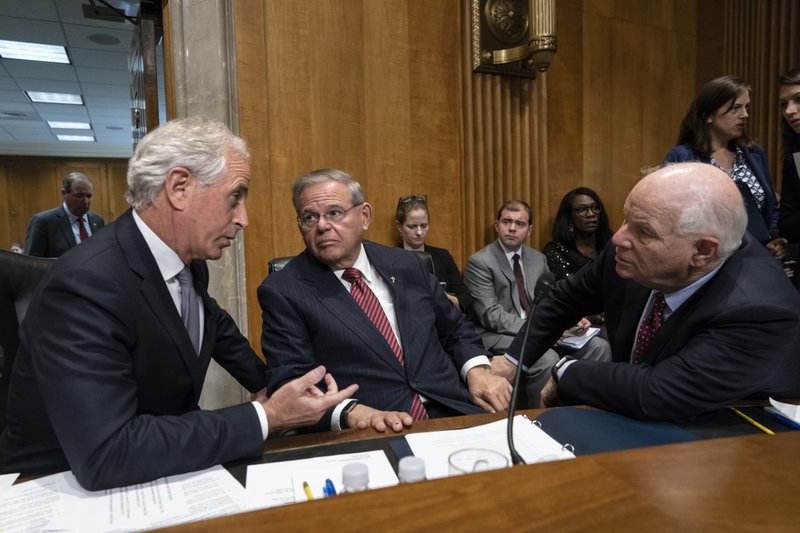
Mike Pompeo, President Donald Trump’s choice for secretary of state, avoided a rare rebuke Monday as the Senate Foreign Relations Committee narrowly recommended him, but the vote served as a warning shot to the White House as nominees to lead the CIA and Veterans Affairs are hitting stiff resistance. Pompeo, who’s now CIA director, received the panel’s approval only after Trump’s last-minute overtures to Sen. Rand Paul, R-Ky. Pompeo’s nomination now goes to the full Senate, where votes are tallying in his favor and Senate Majority Leader Mitch McConnell said he looks forward to voting to confirm him later this week. Trump has been quick to fire his top cabinet secretaries, but Senate Democrats are not so fast to confirm replacements. A grilling is expected Wednesday of Ronny Jackson, the White House physician nominated to head the VA, and Pompeo’s potential replacement at the CIA, Gina Haspel, is also facing scrutiny. It’s also a reminder of how tough it could be to replace Deputy Attorney General Rod Rosenstein. Trump has publicly mused about firing Rosenstein, who is overseeing special counsel Robert Mueller’s investigation into Russian interference in the 2016 election. “Hard to believe,” Trump tweeted Monday about what he called “obstruction.” ″The Dems will not approve hundreds of good people… They are maxing out the time on approval process for all, never happened before. Need more Republicans!” Republicans hold just a slim Senate majority, 50-49, with the prolonged absence of Sen. John McCain, R-Ariz. Pompeo’s bid to become the nation’s top diplomat was in the hands of a few senators, but received a boost Monday when two Democrats, Sen. Joe Manchin of West Virginia and Sen. Joe of Indiana, announced their support. Pressure is mounting on senators from all sides. White House allies are unloading ad campaigns against Democrats from Trump-won states, but progressive groups are pounding senators’ offices in opposition. As soon as Sen. Heidi Heitkamp, D-N.D., announced her support for Pompeo, one group called on her to switch. Ahead of the Foreign Relations Committee’s vote, chairman Bob Corker, R-Tenn., said of the full Senate, “It does appear Mike Pompeo has the votes to be secretary of state.” Supporters point to Pompeo’s resume as a West Point and Harvard Law School graduate who has the president’s confidence, particularly on North Korea. Opponents are focusing on his hawkish foreign policy views and negative comments about gay marriage and Muslims. Paul’s earlier objections to Pompeo, along with overwhelming opposition from Democrats, had set the secretary of state nominee on track to be the first since 1925, when the committee started keeping records, not to receive a favorable recommendation. But Trump and Paul talked repeatedly, including a chat just moments before the vote. “I have changed my mind,” Paul said, explaining he received reassurances that Pompeo agrees with the president that the Iraq war was a “mistake” and that it is time for U.S. troops to leave Afghanistan. Paul’s office said he “got a win” — the promise that Pompeo sides with Trump on those issues — out of the situation, but declined to provide details. “I want Trump to be Trump,” Paul said. Asked about Paul’s change of heart, Trump said, “He’s a good man.” Senators are anxious to have Pompeo in place before international meetings scheduled for later this week and ahead of North Korea talks. Republicans blamed partisan politics for opposition, saying Pompeo is just as qualified as past secretaries of state nominees Hillary Clinton or John Kerry, both of whom received overwhelming support. “A majority of Democrats continue their pointless obstruction to score cheap political points with their base as a willful attempt to undermine American diplomacy,” said White House spokeswoman Sarah Huckabee Sanders. But Democrats resisted easy confirmation of the nation’s top diplomat, and support peeled. Sen. Maggie Hassan, D-N.H., who had been among more than a dozen Democrats who supported Pompeo for CIA director, announced her no vote Monday. “I am concerned that Mr. Pompeo has not demonstrated an understanding that the Secretary of State has an obligation to the American people to stand up for our core values,” she said. Sen. Chris Coons, D-Del., who was among the last Democrats on the foreign relations panel to announce his no vote, said he is concerned that Pompeo “will embolden, rather than moderate or restrain” Trump’s “most belligerent and dangerous instincts.” In a late setback Monday, the panel was short one Republican vote needed for a favorable recommendation because Sen. Johnny Isakson was delivering a eulogy in his home state of Georgia. Rather than postpone voting until his return very late Monday, Coons agreed to allowed his vote to be recorded as “present” so the committee could finish its work. Republished with the permission of the Associated Press.
John McCain demands accounting from VA on money for private care

Sen. John McCain is demanding a full accounting from the Department of Veterans Affairs on the financial status of its private-sector health care program after the agency said it could face another budget shortfall as soon as December. The Associated Press reported this week that the VA had acknowledged its Veterans Choice program could run out of money by year’s end despite receiving $2.1 billion in emergency funding just last month. Another shortfall could force the VA to limit referrals to outside doctors, causing delays in medical care for hundreds of thousands of veterans. In a letter to VA Secretary David Shulkin, McCain, who chairs the Senate Armed Services Committee, said he wants to know specifically when the VA expects Choice to run out of money. McCain cites AP’s report, which included a statement from VA that Choice funds could be depleted as early as December or as late as March. The letter, sent late Wednesday, calls for a VA response by the end of the week. The Arizona Republican noted that Congress was led astray earlier this year after VA provided false assurances that Choice funds would last until early 2018. After Shulkin admitted to a budget shortfall in June, McCain joined other senators to express concern to VA about possible financial mismanagement. Congress ultimately approved $2.1 billion in emergency spending for Choice that was intended to last until February. “We said at the time that it was essential, given the growing demand for care under the Choice program, that the VA immediately correct the failures that created such a serious shortfall,” McCain wrote. “It appears as if you have not done so.” In its statement earlier this week to AP, the VA said it hoped to move quickly on a proposed long-term legislative fix that would give veterans even wider access to private doctors. The proposal, under review by the White House budget office, would seek money to keep Choice running for much of next year as VA implements wider changes. Earlier this year, the VA began limiting referrals to outside doctors as money started running low. The Choice program was passed by Congress in 2014 in response to a wait-time scandal at the Phoenix VA medical center that spread nationwide. Some veterans died while waiting months for appointments as VA employees manipulated records to hide delays. The controversy spurred Congress to establish Choice as a pilot program to relieve pressure at VA hospitals. Republished with permission from the Associated Press.
John McCain calls brain cancer prognosis ‘very poor’
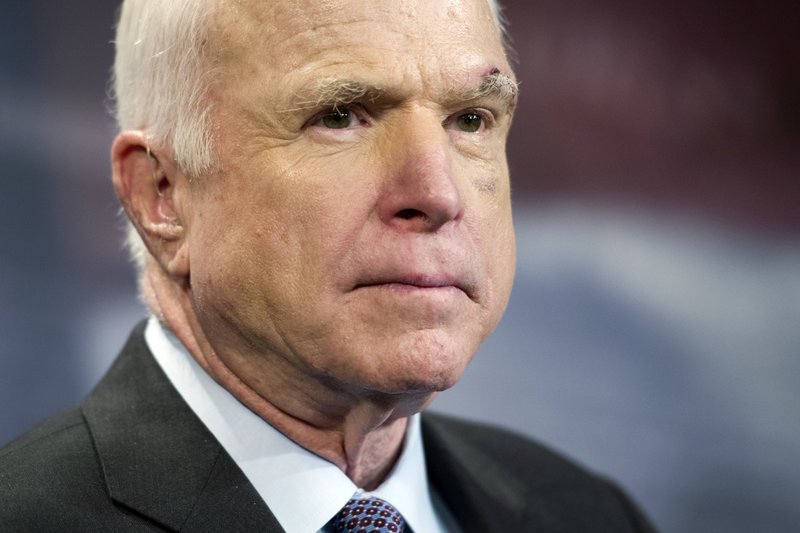
U.S. Sen. John McCain says doctors have given him a “very poor prognosis” as he battles brain cancer. McCain underwent surgery in July for a brain tumor that was later found to be a form of glioblastoma, the same type of cancer that took the life of his former Senate colleague Edward M. Kennedy in 2009. McCain tells CBS’ “60 Minutes” in an interview that aired Sunday night that he thinks about Kennedy a lot. He says Kennedy continued to work despite the diagnosis and “never gave up because he loved the engagement.” McCain says he has “feelings sometimes of fear of what happens,” but counters that with gratitude for having lived “had a great life.” He adds: “it’s not that you’re leaving, it’s that you — that you stayed.” Republished with permission from the Associated Press.
Donald Trump tweets take on GOP holdouts on health legislation

Sen. John McCain’s opposition to the GOP’s last-ditch effort to repeal and replace the Obama health law has dealt a likely fatal blow to the legislation — and perhaps to the Republican Party’s years of promises to kill the program. It was the second time in three months the 81-year-old Arizona Republican had emerged as the destroyer of his party’s signature promise to voters. “John McCain never had any intention of voting for this Bill, which his Governor loves. He campaigned on Repeal & Replace. Let Arizona down!” President Donald Trump said in a series of tweets Saturday that attacked GOP senators who hadn’t gotten behind the bill. The measure was co-written by South Carolina Sen. Lindsey Graham, McCain’s closest Senate ally, and Sen. Bill Cassidy, R-La. “McCain let his best friend L.G. down!” Trump said, adding that the health bill was “great for Arizona.” McCain, who is battling brain cancer in the twilight of a remarkable career, announced Friday that he could not “in good conscience” vote for the legislation. “I believe we could do better working together, Republicans and Democrats, and have not yet really tried,” McCain said. “Nor could I support it without knowing how much it will cost, how it will affect insurance premiums, and how many people will be helped or hurt by it.” His opposition all but ensured a major setback for Trump and Senate Majority Leader Mitch McConnell, R-Ky. It also appeared likely to deepen rifts between congressional Republicans and a president who has begun making deals with Democrats out of frustration with his own party’s failure to turn proposals into laws. During the election campaign Trump had pledged to quickly kill the Affordable Care Act — “It will be easy,” he contended — and he has publicly chided McConnell for not winning passage before now. McCain joined Sen. Rand Paul, R-Ky., as two declared GOP “no” votes on the repeal legislation, though Trump held out hope on Paul. “I know Rand Paul and I think he may find a way to get there for the good of the Party!” Trump tweeted. With Democrats unanimously opposed, two is the exact number of GOP votes McConnell can afford to lose. But Sen. Susan Collins, R-Maine, said Friday she, too, is leaning against the bill, and Sen. Lisa Murkowski, R-Alaska, was also a possible “no,” making it highly unlikely that McConnell can prevail. Trump tweeted that health premiums have risen dramatically for Alaskans under the health law, “deductibles high, people angry!” While Trump tries to keep up the pressure, the GOP seems destined to fail again on a campaign promise that every Republican agreed on — right up until the party obtained full control of Congress and the White House this year and was actually in position to follow through. Trump, at a political rally Friday night in Alabama, he said he would continue the fight to repeal the law. “You can’t quit when you have one or two votes short.” Graham, in a statement, said he would “press on,” and he reaffirmed his friendship with McCain. Up until McCain’s announcement, McConnell allies were optimistic McCain’s relationship with Graham might make the difference. GOP leaders hoped to bring the legislation to the full Senate this coming week. They face a Sept. 30 deadline, at which point special rules that prevent a Democratic filibuster will expire. Democrats hailed McCain’s announcement and pledged to commit to the bipartisan process he sought. GOP Sen. Lamar Alexander of Tennessee and Democratic Sen. Patty Murray of Washington have been working on a package of limited legislative fixes to the health law’s marketplaces. “John McCain shows the same courage in Congress that he showed when he was a naval aviator,” said Senate Minority Leader Chuck Schumer, D-N.Y. “I have assured Sen. McCain that as soon as repeal is off the table, we Democrats are intent on resuming the bipartisan process.” Trump charged that Schumer “sold John McCain a bill of goods. Sad.” The Graham-Cassidy bill would repeal major pillars of the health law and replace them with block grants to states to design their own programs. “Large Block Grants to States is a good thing to do. Better control & management,” Trump wrote. But major medical groups said millions of people would lose insurance coverage and protections. A bipartisan group of governors announced their opposition. Yet Republican congressional leaders, goaded by GOP voters and the president himself, were determined to give it one last try. Trump spent much of August needling McConnell for his failure to pass a repeal bill, and Republican lawmakers back home during Congress’ summer recess heard repeatedly from voters angered that after seven years of promises to get rid of the health law, the party had not delivered. The House passed its own repeal bill back in May, prompting Trump to convene a Rose Garden celebration, which soon began to look premature. After the Senate failed in several attempts in July, the legislation looked dead. But Cassidy kept at it with his state-focused approach, and the effort caught new life in recent weeks as the deadline neared. Trump pushed hard, hungry for a win. The bill would get rid of unpopular mandates for people to carry insurance or face penalties. It would repeal the financing for Obama’s health insurance expansion and create a big pot of money states could tap to set up their own programs, with less federal oversight. It would limit spending for Medicaid, the federal-state program that now covers more than 70 million low-income people. Insurance rules that protect people with pre-existing conditions could be loosened through state waivers. Over time, the legislation would significantly reduce federal health care dollars now flowing to the states. But McConnell had little margin for error in a Senate split 52-48 between Republicans and Democrats, and could lose only two votes, counting on Pence to break the tie. Republished with permission from the Associated Press.

